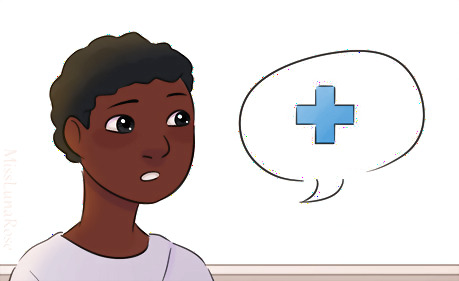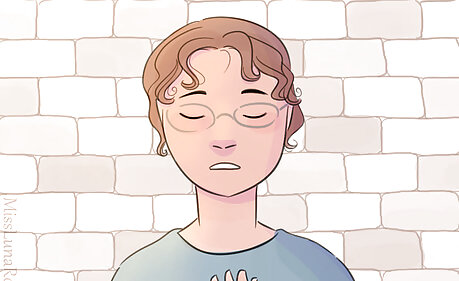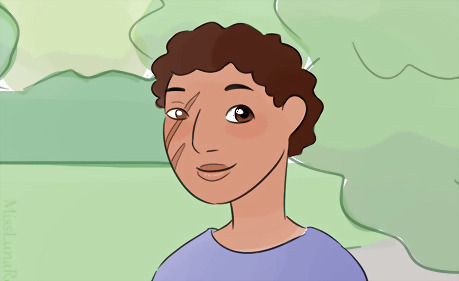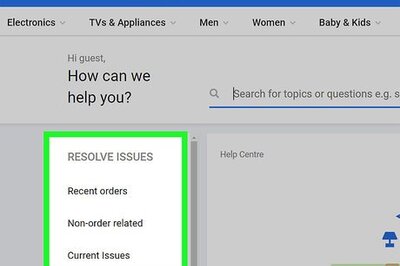
views
X
Trustworthy Source
Mayo Clinic
Educational website from one of the world's leading hospitals
Go to source
Living with someone who has Illness Anxiety Disorder can be easier if you learn as much as you can about the condition, and be sure your loved one gets professional help. Learn how to help a friend or family member who has hypochondriasis, and take care of yourself, too.
Helping Someone with Illness Anxiety

Understand that illness anxiety creates real distress. Illness Anxiety Disorder (IAD) is a mental disorder, just like depression or OCD, and a real illness. Even if the illness is not real, the stress feels very real. Severe illness seems like a serious possibility to your loved one, and bland reassurances won't make it go away. Thanks to the internet, the world is flooded with information about the latest illness outbreaks and potential causes of different diseases. Helping a person who has IAD avoid as much of this information as possible will help to filter some of that out.

Listen, even if the claims sound bizarre or made up. Those who are struggling with IAD need to be heard. This helps to prevent anxiety and panic which can be caused by being ignored. If no one seems to take notice, your loved one's beliefs about the illness may multiply, causing him or her to believe that the fictional condition is getting worse. Active listening does not mean agreeing with the person's fear. It means giving your loved one the time to be heard in a supportive manner and letting your loved one know you are hearing his or her concerns.

Acknowledge the symptoms and give gentle reminders that it might be okay. People who have illness anxiety disorder tend to worry excessively about their symptoms. By acknowledging your loved one's symptoms, you may help to validate their feelings. This puts the person at ease. By gently suggesting their pain could be from a less serious cause, you can also offer an easier solution to your loved one's fears. For example, you might say "I got similar shoulder aches from carrying a heavy backpack, before I switched to my rolling one. Maybe you're tense or sore from activity." Or, "Stomach pains usually don't mean stomach cancer. What's most likely is that you are stressed, under the weather, or digesting something that didn't agree with you."

Offer to treat the symptoms, without rushing to determine a cause. If your loved one has a stomachache, offer stomach pills. If your loved one's shoulder hurts, offer to show him or her some stretches. Doing something about your loved one's symptoms—even something small—can help your loved one stop obsessing over the symptoms. Treat the pain or complaint without speculating too much about the possible diagnosis. Overreacting and assuming the worst is a big part of their stress so avoid buying into this stress. Assume that the symptoms are real. Your loved one is certainly experiencing real pain. It might have a physical cause, such as knee strain or mild flu, or it may be caused by stress. Either way, your loved one will probably benefit from treatment. Seek medical advice from a trusted doctor to address the pain.Did You Know? Anxiety can cause physical problems like aches and pains, nausea, fatigue, fast heartbeat, shortness of breath, dizziness, and more. Changing medications may change how anxiety manifests in the body, too. Even if there's no clear physical cause, the symptoms are real and distressing.

Encourage healthy stress-relief activities at home. Anxiety can cause physical symptoms, which can cause more anxiety, and result in a vicious cycle. While stress-reducing activities won't cure them, it can help interrupt the cycle and improve their coping skills. Try introducing and encouraging some activities that can help your loved one handle stress. Mindfulness Meditation Breathing and muscle relaxation exercises Yoga Routine exercise, even just neighborhood walks Getting fresh air Time spent in nature and sunlight Any at-home activities suggested by your loved one's doctor or therapist

Encourage your loved one to do activities that they enjoy. Try getting your loved one to go outdoors or to engage in a favorite activity. This may help your loved one get their mind off of stressful things, and help them relax a little. Getting more physical activity can be especially helpful for anxiety, well-being, and physical condition. Think about family exercise opportunities like hiking or neighborhood walks. Encourage all family members to be active. This is good for everyone and it means healthy role modeling for your loved one.
Getting Professional Help

Accompany your loved one to a doctor. Allow your loved one to explain the symptoms to the doctor. If the doctor does not identify IAD, then you may want to take the doctor aside and briefly explain your concerns. "Hypochondria" is an outdated term, so the doctor will probably identify it as Illness Anxiety Disorder. It is very hard to rationalize someone out of hypochondriasis; But you can point out ways in which this issue is impairing their life and encourage them to find treatment.

Help your loved one decide on treatment options. Illness anxiety may be treated with antidepressants or anti-anxiety medications, and/or psychological therapy. Make arrangements for the person to see a therapist around once a week if possible. Cognitive Behavioral Therapy may be an effective approach, as well as gradual exposure therapy.

Discuss the possibility of co-occurring issues. People with hypochondria may also experience other anxiety disorders and/or depression. Consider getting your loved one screened for these conditions as well. If your loved one is nervous, assure them that the screening just means filling out a form about their symptoms. Remember, fear is a big part of the disorder. Listening to them, and validating their feelings, can help them deal with their fears.

Attend support groups for this condition. A person with IAD may be able to locate a nearby support group for individuals with this condition. It may also be helpful for your loved one to attend a support group for anxiety, as the two are closely related. There are support groups offered for both the person with the condition, and the family support members. Talk to the person's therapist and ask for support group recommendations.
Staying Balanced

Set boundaries as needed. Your health and well-being is your first responsibility. It's okay to end a conversation or demand space if you don't have the energy to deal with their anxiety at the moment. Try gently changing the subject. Otherwise, tell your loved one that you need some quiet time, or that you're going to take a break. It may be hard at first to step away and follow through with the boundaries you set, but sticking to them will reinforce them over time.

Help your loved one build a support system. You don't need to be your loved one's only helper. Encourage your loved one to reach out to others and seek mental health care, so that he or she is getting support from various sources. Support can come from family members, friends, coworkers, religious groups, counselors, and members of a support group. Not only will this benefit both of you, but the more people that know about the disorder and can offer true support, the better. Hiding the diagnosis can result in someone with IAD seeking out people to talk to who don't know the person has IAD, and the person may get sucked into an anxiety spiral with them.

Give yourself plenty of time to relax. You can't help a drowning person if you're barely afloat yourself. Spend time each day doing something you enjoy, so that you can be at your best mental health. Self-care can be anything you feel good doing or that helps you relax. The beauty of self-care is it is up to you to choose if you relax better by getting a massage, spending quiet time reading or even doing intense exercise. Find a confidante whom you can talk to about your struggles. This should be someone who is removed from the situation who can listen without judgment.

Talk to a therapist if you are overwhelmed. It's difficult to pour into someone else's cup when your own is empty. Find a source of support for yourself in the form of a counselor or therapist. This person can offer you helpful suggestions as to how to cope with living with someone who has IAD, and how to help your loved one better. Talking to a therapist yourself can be a positive example for the person you are helping, as well as a support for you. A person who has IAD may feel ashamed about getting therapy, and you seeking services can actually normalize the process for them.

Do fun things together to maintain a positive connection. It's easy for your loved one to get trapped in negativity and fear. Help make time for happy memories and fun activities. Think about what the two of you enjoy and make time for it. This can build their resilience and your relationship together. Fun things can be virtually anything that allows the two of you to bond and change the dialogue from an illness. Examples may include engaging in a sport, watching a movie, or planning an exciting vacation. Think about their favorite things and see if you can plan some activities around these. To support a hypochondriac, be a good friend, ask questions, and empathize with them.















Comments
0 comment